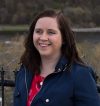- A Camp Noah participant colors a picture of the Puerto Rican flag. The ELCA camp was offered for children displaced by Hurricane Maria. Photos courtesy Liberty Lutheran
- A Camp Noah art project.
The rain stopped, and the sun began to shine. A beautiful rainbow appeared over the ark, a symbol of hope for tomorrow.
That familiar conclusion to the story of Noah’s ark takes place in the aftermath of a terrible flood.
Those conditions became a reality for many families dealing with the after-effects of a range of megastorms over the last several years—perhaps the most notorious of which was Hurricane Maria. The hurricane touched down in Puerto Rico in September 2017, leaving a trail of devastation behind.
One year later, Maria has been designated one of the deadliest hurricanes in U.S. history. Authorities say 2,975 lives were lost, with an additional 250,000 forced to leave their homes for the U.S. mainland. What followed was months of power loss, a water shortage, abandoned ruins of homes unfit for habitation, and a growing mental health crisis that the Department of Health of Puerto Rico reports saw the suicide rate nearly triple.
The storm is over, but many Puerto Ricans are still waiting for their rainbow.
In Reading, Pa., some of the youngest of those who fled the island had the chance to heal, laugh and hope at the weeklong, volunteer-run Camp Noah. The bilingual program, made available through Lutheran Disaster Response and Lutheran Social Service of Minnesota, welcomed parent-volunteers Aug. 13-17 at St. Luke Lutheran Church, as an event designed to bring the community together.
Rebecca Knox, a chaplain resident and former pastor of St. Luke, said the camp helped kids work through the “emotional storms” that followed Maria. She was responsible for coordinating meals, donations and transportation for the 40 children who attended. While the week’s themes were building resilience and restoring hope, organizers were also intent on simply letting the kids be kids.
“Campers were given opportunities for storytelling and playing games with lots of laughter. It’s OK to play and be a child after trauma too.”
“Campers were given opportunities for storytelling and playing games with lots of laughter,” Knox said. “It’s OK to play and be a child after trauma too.”
Many children were experiencing grief from loss of relatives, friends or pets, as well as the general upheaval of relocating. Camp leaders used a variety of activities, including stories, puppets, creative writing and music, to draw the children out and help them express their feelings.
Knox described this process as helping children develop “emotional, spiritual and linguistic vocabulary for what their heart is already holding.”
Katie Lyon, a pastor of Christ Lutheran Church in Reading, served as mental health coordinator for Camp Noah, providing support to children grappling with big questions and working through life-changing trauma.
Knox and Lyon agreed that one of the most important aspects of the week was building community connections—between congregations and new residents and between Puerto Rican families who had shared the hurricane experience. Listening and talking to other children who had lived through the same storm was powerful, helping to build trust and showing campers that their feelings were normal and valid, volunteers said.
The week culminated in an “everybody birthday party,” a rare chance for the campers to celebrate amid a season of instability. After having experienced their own version of 40 days and 40 nights of rain, Camp Noah participants saw how the threads of community can be woven into a hopeful tomorrow.







